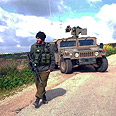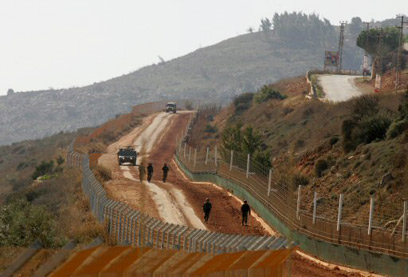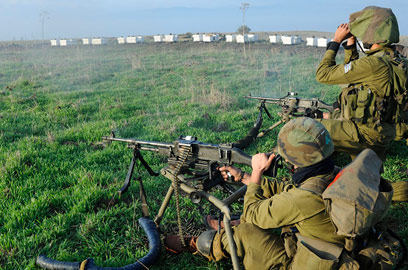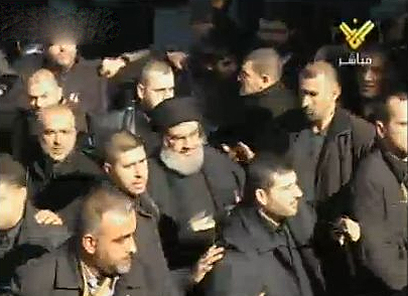
'Next Lebanon war will be different'
As IDF marks six years since Second Lebanon War, officials say future conflict will entail ground operation, 'incredible damage' to Beirut
IDF officials painted a bleak picture of a future conflict between Israel and Lebanon, saying that it will probably entail a massive response by the IDF, including the deployment of ground forces.
On the eve of the sixth anniversary of the Second Lebanon War, IDF officials expressed grave concern over the future of the relative calm noted on the Lebanese border.
Between the Islamist dawn in Egypt, the bloody uprising in Syria and the overall instability in the Middle East, the situation in Lebanon is seen as fairly stable; but IDF officials warned Thursday that as Hezbollah's grip on the country grows, looks may be deceiving.

The Israel-Lebanon border (Photo: AFP)
"Any escalation can result in rocket fire on central Israel," a senior officer said.
"The next war will be different. We'll have to attack with more force, more violently, to halt any assault of the home front as quickly as possible."
Israel is aware that the deployment of ground forces "has a serious impact on Hezbollah's launching abilities," he continued, adding that ground maneuvers "Will cause them massive damage.
"Even if we go only after their military infrastructure… There will be a completely different ratio between the explosives used on Lebanon and those used on Israel."
The officer added that while any conflict that would bring into play a full-on Israeli response could be over within five or six days, "We will undoubtedly suffer quite a few casualties, both among IDF ranks and in the home front. This is why a ground deployment would be a must."
Commenting on the Goldstone Report, penned following Operation Cast Lead, the officer said that the damage caused to Lebanon by such a conflict with Israel "Will make Goldstone pale in comparison – because Hezbollah has chosen to make the most cynical use of civilian population centers."
'We won't fire first'
The IDF has clear indication that Hezbollah has increased its reconnaissance efforts along the northern border.
Most recently, the IDF has been able to detect a Hezbollah tactical command post set up in the Lebanese village of Kila, directly across the border from the northern Israeli city of Metula.
"Generally, our policy is not to be the ones to fire first, but once we are fired upon we will react with full force," a senior GOC Northern Command officer said. "We will shoot to kill."
The IDF is marking what has been lauded as the six "most stable years we've seen in the sector since the 1970s."
But Hezbollah movements on the border are evident and military sources said that there is no doubt that the Shiite terror group is getting its funding from Iran.

IDF troop on the border (Photo: IDF)
Brigadier-General Harzi Halevy, commander of the IDF's Galilee Division, said that the military "is thoroughly and professionally preparing for the possibility of another war; taking into account that the enemy possesses varied fire power and it is well hidden within civilian society."
The next war, he added, will see the IDF "Strike with full force. We will have to go inside (Lebanon) and wreak havoc – not as punishment, but because that is where the enemy is.
"A third conflict will see Lebanon suffer more than it did during the second one. We will give the Lebanese army the chance not to be 'the enemy'; but any attack will be met with an offensive, and they will be easier to handle than Hezbollah," Halevy said.
Lebanon still licking its wounds
As for Syria's hold on Lebanon and Damascus' control over Hezbollah, Halevy said it is hard to believe that a Lebanese offensive against Israel would serve any of Syrian President Bashar Assad's objectives at this time.
The IDF is following the developments in Syria very closely, a top military source said. Should the regime be overthrown, Hezbollah may choose to strike Israel – or Israeli targets worldwide – "to set the tone."
As for concerns that various advanced weapons are, or will be, making their way from Damascus to Hezbollah, the officer said that "So far, we have yet to see things like surface-to-air missiles find their way from Syria to Hezbollah."

Knows better? Nasrallah in rare public appearance (Screenshot)
Israel believes that in many respects, Lebanon is still licking the gaping wounds it suffered in 2006 and Hezbollah is not as gung-ho to provoke a conflict as it may seem.
Hezbollah Chief Sheikh Hassan Nasrallah "Knows enough to be able to refrain from interfering in case of an Israeli strike on Iran," a military source told Ynet.
"There is also evidence that the Iranian affect on Hezbollah is diminishing in light of the (West's) sanctions on Tehran. Their ability to support Hezbollah has decreased."
Still, the Shiite group is constantly preparing for a possible conflict. IDF intelligence is acutely aware of Hezbollah's deployment and reconnaissance efforts along the border.
"It may be difficult to know enough to prevent the next terror attack, but in case of war, our intelligence has dramatically improved compared to the situation before the Second Lebanon War," a GOC Northern Command officer said.
"Their 'targets bank' has also grown and they are much more diverse now."
The IDF said that despite the link between the Lebanese army and Hezbollah, it is unlikely that they will coordinate their moves should a conflict with Israel erupt, fearing an intelligence breach.
- Receive Ynetnews updates directly to your desktop










